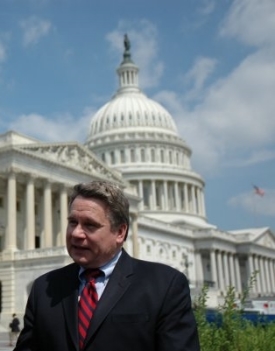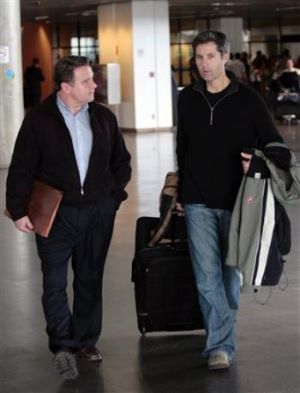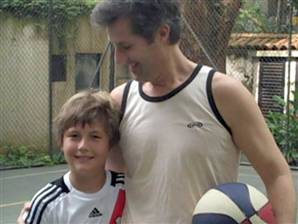
Unsung Hero
NJ Congressman Christopher Smith
By Emily Faherty
New Jersey Monthly Magazine – Best of Jersey Edition
March 15, 2010
By now, everyone is familiar with the David Goldman custody battle. But what everyone might not be aware of is the depth of Congressman Chris Smith’s involvement in returning Sean to his father.
 Chris Smith has always rooted for the underdog. So it’s no surprise that, when the congressman learned the plight of Tinton Falls father David Goldman, he not only lent a helping hand, he jumped in with both feet.
Chris Smith has always rooted for the underdog. So it’s no surprise that, when the congressman learned the plight of Tinton Falls father David Goldman, he not only lent a helping hand, he jumped in with both feet.
Smith, 57, is in his fifteenth term representing New Jersey’s 4th Congressional District (which includes towns in Burlington, Mercer, Monmouth, and Ocean counties) in the House of Representatives. Sitting in his Hamilton Township office, almost a year to the day since he got involved with the Goldman case, Smith admits he was not initially inclined to help, considering that Tinton Falls lies outside his district.
Then Smith saw Goldman’s public plea on Dateline NBC on a Friday night in January 2009. Smith’s wife, Marie, exclaimed, “You gotta get involved,” and started Smith thinking about how he would feel in Goldman’s shoes. “As soon as you get into this, you can’t stop, because you just empathize,” says Smith, a father of four and grandfather of two. “I would be brokenhearted beyond words if something happened. And it did happen to him.”
Along with the rest of the country, Smith was captivated by the dramatic story. Goldman had been separated from his son, Sean, 9, since June 2004 when his estranged wife, Bruna Bianchi Carneiro Ribeiro, took the then 4-year-old to her native Brazil on a supposed two-week vacation. Arriving in Brazil, Bianchi informed Goldman their marriage was over, and she and Sean would not be returning to New Jersey.
Goldman used every means in his power to bring Sean back, while Bianchi prevented him from having contact with his son and soon married a well-known lawyer, João Paulo Lins e Silva. When Bianchi died during childbirth in August 2008, her new husband and Sean’s maternal grandparents kept the boy in Brazil. Goldman made countless unsuccessful appeals and trips to Brazil, only to find himself trapped in an international legal nightmare.
“I hoped and prayed that someone would hear my plea who could and would actually help,” says Goldman of the Dateline NBC interview. “At that point I was beyond desperate.”
Unbeknownst to Goldman, Smith was the obvious choice for the arduous task. With a well-deserved reputation as a champion of human rights and a full-court press attitude, Smith, a Republican, has dedicated his nearly 30 years in Congress to advancing the causes he deems most important—from rallying the pro-life movement to combating international human trafficking.
Smith met with Goldman in Hamilton several days after the Dateline NBC interview and immediately began brainstorming ways to help Goldman navigate the system and get Sean back. The next day, Smith introduced a Congressional resolution. Later in the week, Smith and Goldman began planning a trip to Rio de Janeiro.
“Within five minutes of our initial meeting,” Goldman says, “he looked me straight in the eyes and said, ‘The next time you go to Brazil, I will go with you. We will drive in the same car, go to the same places. Wherever you go, I go. Wherever I go, you go. We’ll be like brothers.’”
Smith’s bright blue eyes almost well up when discussing Goldman. “After that first meeting with David, I was numb,” he says. Shocked by the setbacks that Goldman had endured—broken promises to see his son, intermittent phone calls, and harrowing demands from Bianchi’s family—Smith recalls the promise he made: “I will do anything you want me to do, I’ll carry your bags, but bottom line, you’re the quarterback. I don’t want to do anything without your permission, because this is your son—this is all about you—this is all about bringing Sean home.”
Smith saw an opening for Sean under the Hague Convention, a treaty established for the international protection of children. “It draws a bright line and says you cannot abduct a child,” says Smith. According to the congressman, the developments in Brazil were a “miscarriage of justice in the highest order, where a boy is being hurt and a father is being hurt.” With his political leverage, Smith hoped to get Goldman on a level playing field with the Brazilian family and “push back aggressively, smartly, wisely, and prudently.”

In their first trip together to Brazil, Smith and Goldman went from government office to office. “We sat there for hours talking to people, we were in no hurry,” says Smith. “I’d say ‘You have to hear this man, you have to listen to him.’”
“I couldn’t lose hope, I couldn’t and wouldn’t lose focus,” Goldman says. “I would not let the red ball of fury or the constant painful setbacks enter my lens…I would never give up on my son.”
Most of the Brazilian officials were responsive. When Goldman was allowed a visit with Sean in February 2009, the first time in four-and-a-half-years he had seen the boy, Smith was there. Goldman believes this gave Smith “an even greater appreciation of the bond that Sean and I have and how wrong and harmful to Sean the situation was.”
Behind the scenes, Smith lobbied in the States with resolutions, hearings, continual floor speeches, meetings with the Brazilian ambassador, and visits to the United Nations. He became Goldman’s right-hand man, often his press secretary, and a trusted friend. “I figured I’m his staffer,” says Smith. “I’m working for David, my fellow New Jerseyan.”

After numerous appeals, delays, and setbacks, Brazilian supreme chief justice Gilmar Mendes finally awarded full custody to Goldman on December 22, 2009, putting an end to the five-and-a-half-year court battle. The father and son were reunited on Christmas Eve, with Smith sacrificing his own holiday to stand by Goldman’s side. This was the second of the two trips to Brazil the congressman made with Goldman. Smith’s travel, authorized by Speaker of the House Nancy Pelosi, was paid for using United States Department of State travel funds.
“We did it by the book, and I can’t think of a single thing, no stone that we left unturned,” Smith says. “But David was the star. He showed who he was—the compassion and love that he had for his son—and he won the day.”
During the ordeal, Goldman got to know the man behind Smith’s poised political persona. “He was like a brother,” he says, “or even greater than a brother because he chose to help me, a man who he has no blood relation to, and practically a stranger at the time of his pledge.”
When the congressman hears this, he blushes and shakes his head. “Look, I just did what my faith and being in this strategic position allowed me to do,” he says. “And I was just following my wife’s orders.” Even if that meant postponing his own Christmas tradition of watching It’s a Wonderful Life with his family. Marie “was 1,000 percent behind it and just wanted to make sure I got involved,” Smith says. “We’re all about family—there wasn’t even the slightest hesitation.” He credits his “strong working class parents” with giving him an appreciation for come-from-behind victories, as well as the value of hard work.
“That’s what my parents were all about,” says Smith, who was born in Rahway and grew up in Iselin. “They were always passionately in favor of the underdog, and I’ve always been taught to look out for the disenfranchised.”
Raised as a Roman Catholic with two brothers, Smith attended St. Mary’s High School in Perth Amboy, where he ran track and cross-country, wrestled, and played soccer. His father was a teamster and later ran his own wholesale sporting goods store, which Smith was prepared to take over upon graduating from Trenton State College (now the College of New Jersey) in 1975 with a degree in business administration.
In college, however, Smith became involved with human-rights causes. As a freshman, he gave a right-to-life speech for a public-speaking class, inspiring him to join the school’s pro-life committee, where he met his future wife. Smith spent time in the state legislature and as the executive director of the New Jersey Right to Life Committee, but like many a Jersey story, his dream started over a slice.
“I’ll never forget,” Smith says, “Marie and I were having pizza in Ewing, and as we were eating a pie—I’d eat most of it—I said, ‘I’m gonna run for Congress someday.’ We both just laughed, but I really felt that it would be a great place to do good.”
In his early twenties at the time, newly married, and starting a family, Smith figured he would wait 20 or 30 years to run for office. But in 1978, the Republicans were looking for a candidate. “I threw my hat in the ring and really thought I had a shot,” says Smith, who was 25 at the time (the minimum age to run). “Nobody else thought that, though, and I lost.” Two years later, still the underdog, he came back and won the traditionally Democratic 4th District against the powerful 25-year incumbent Frank Thompson who was tied up in the Abscam scandal.
“I was a gamer and believed in running flat out,” Smith says of his low-budget, grassroots operation. “Despite the odds—and the odds were overwhelmingly against me—I had at least two people at all times who believed in me—my wife and me.”
Today, with 29 years in the House, Smith still credits Marie with making his job easier and helping him sort out ideas, even if those ideas come at 3 am. “My wife has always said, if there’s one thing I have in spades, it’s persistence,” he says. Being known as the idea guy in Congressional circles isn’t a bad thing, either. Smith is one of the most active legislators and is currently tied for second in authoring bills in the House, with most focusing on human rights.
“Human rights are for everyone or they’re not rights,” says Smith, who is also a senior member of the House Foreign Affairs Committee. In addition to being perhaps the strongest pro-life voice in the House, Smith is an advocate for religious freedom, veterans’ affairs, human-trafficking and sweatshop labor victims, cord-blood stem cell research, autism and Lyme disease research, and child-abduction victims.
While his Trafficking Victims Protection Reauthorization Act of 2005 was a landmark in combating the international epidemic, Smith also implements his local work with constituents in New Jersey as laws in Washington. The Autism Statistics, Surveillance, Research, and Epidemiology Act, which he sponsored, came out of casework in Brick Township in the 1990s; a bill calling for Lyme disease education and prevention laws originated from casework in Jackson in July 2009; and, of course, the International Child Abduction Prevention Act of 2009 was inspired by Smith’s work with David Goldman.

“As we had all hoped, David was ‘walking point’ for all the other families left behind and abducted children,” Smith says. Since Goldman, other left-behind parents have flocked to Smith’s office. “I often tell David, ‘You birthed the human rights movement here,’” Smith says. “‘That should make you feel good, despite all your pain.’”
Goldman shows his thanks for Sean by giving back. “It’s a global problem, and there is a lot of work to be done to improve the implementation of the Hague Convention,” he says. “There are nearly 3,000 American parents who continue to live and breathe this unthinkable horror. But thankfully, there is Congressman Smith, who is truly the voice of hope and who can and will make a difference.”
Dressed in a crisp blue-and-white-striped button-down and a red-and-blue striped tie, Smith says he sees himself as “a very serious lawmaker.” Other than a few interjections of laughter, he is all business when discussing his work. “I don’t put my feet up on the table in the office,” he says. “I come to work and I can make a difference every single day of the week at this job.”
His can-do attitude often sets Smith apart from his colleagues in gridlocked D.C. “Part of it is indifference,” he says. “But a lot has to do with a false sense of how you can get the ball down the court to protect those who are at risk. And if we’re not doing all we can do, then shame on us.”
That includes reaching across the aisle, says the moderate Republican. “I do believe in bipartisanship,” he says. “I’ve been in this business long enough to say, ‘Who gives a damn about the credit?’ Do what is right and the chips fall into place.”
The chips have fallen into place at the polls for Smith, who has received more than 60 percent of the vote each year since the mid 1980s. But he still faces reelection every two years, and there are many in the 4th District, and the rest of New Jersey, who will not be rooting for him when he shoots for his sixteenth term this fall.
In addition to receiving heavy criticism from pro-choice organizations, political foes say he focuses too much on international causes, spends too much time in Washington, D.C. (He has lived just outside Washington since entering Congress in the 1980s but confirms his “home is in Hamilton Township”), and has neglected local issues, including job creation, lower taxes, and improved quality of life for residents.
His critics include Howard Kleinhendler of Lakewood, a Democrat who hopes to challenge Smith this fall. “People are fed up with government, and just because you’re an incumbent is not an automatic ticket to reelection,” says Kleinhendler, a Manhattan attorney with Wachtel & Masyr. “But I will be the first person to admit, this guy is a formidable bull adversary.”
Smith’s 2008 election opponent, Bordentown resident Josh Zeitz, saw that firsthand. “I thought it was time for him to face a real and healthy challenge,” says Zeitz, who now serves as an aide to former governor Jon Corzine. However, Zeitz says it is difficult to upend Smith without raising the considerable funds for a major media drive. (Smith raised $928,729 in campaign funds in 2008; Zeitz raised $481,979.) “He’s been able to ride pretty easy in his 30 years of incumbency…but he’s been riding on fumes for the past fifteen years,” Zeitz says. “But he’s a cagey politician, and I think he’ll remain in Congress a while longer.”
Kleinhendler admits, “He’s a good guy and he’s dedicated almost 30 years of public life to helping people on the international stage, and [for] that I give him credit. Where I think he failed is that he hasn’t focused on the quality of life of the people in the district.”
Smith denies that he is inattentive to his constituents. “Laws are made in Washington, and I’m there five days a week. But I do pay close attention to what’s going on in my district. I look for opportunities to turn it into legislation,” he says, and “generate national and international consequences and implications.”
Which is what he did in reuniting David and Sean Goldman. Smith says he is still passionate about his position in the House, and intends to keep it in November and continue fighting for underdogs. “There is wisdom to be tapped in the disadvantaged,” he says. “And I’m more enthusiastic now than ever.”
Copyright © 2010 New Jersey Monthly Magazine
Congressman Chris Smith: http://chrissmith.house.gov/